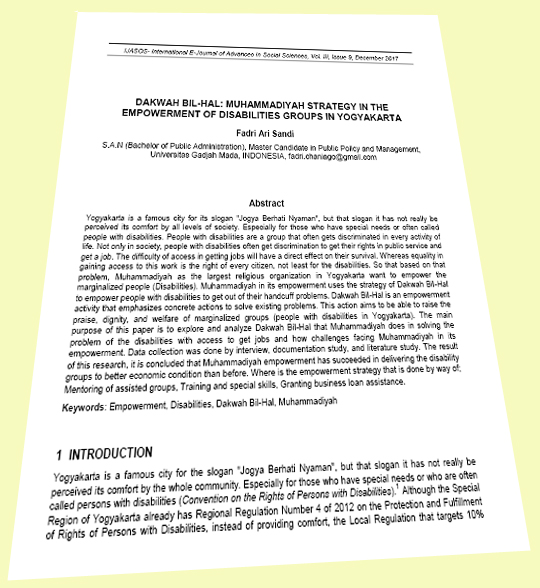DAKWAH BIL-HAL: MUHAMMADIYAH STRATEGY IN THE EMPOWERMENT OF DISABILITIES GROUPS
Dibaca: 701
Penulis : Fadri Ari Sandi
Abstract
Yogyakarta is a famous city for its slogan "Jogya Berhati Nyaman", but that slogan it has not really be perceived its comfort by all levels of society. Especially for those who have special needs or often called people with disabilities. People with disabilities are a group that often gets discriminated in every activity of life. Not only in society, people with disabilities often get discrimination to get their rights in public service and get a job. The difficulty of access in getting jobs will have a direct effect on their survival. Whereas equality in gaining access to this work is the right of every citizen, not least for the disabilities. So that based on that problem, Muhammadiyah as the largest religious organization in Yogyakarta want to empower the marginalized people (Disabilities). Muhammadiyah in its empowerment uses the strategy of Dakwah Bil-Hal to empower people with disabilities to get out of their handcuff problems. Dakwah Bil-Hal is an empowerment activity that emphasizes concrete actions to solve existing problems. This action aims to be able to raise the praise, dignity, and welfare of marginalized groups (people with disabilities in Yogyakarta). The main purpose of this paper is to explore and analyze Dakwah Bil-Hal that Muhammadiyah does in solving the problem of the disabilities with access to get jobs and how challenges facing Muhammadiyah in its empowerment. Data collection was done by interview, documentation study, and literature study. The result of this research, it is concluded that Muhammadiyah empowerment has succeeded in delivering the disability groups to better economic condition than before. Where is the empowerment strategy that is done by way of; Mentoring of assisted groups, Training and special skills, Granting business loan assistance.
1. INTRODUCTION
Yogyakarta is a famous city for the slogan "Jogya Berhati Nyaman", but that slogan it has not really be perceived its comfort by the whole community. Especially for those who have special needs or who are often called persons with disabilities (Convention on the Rights of Persons with Disabilities). Although the Special Region of Yogyakarta already has Regional Regulation Number 4 of 2012 on the Protection and Fulfillment of Rights of Persons with Disabilities, instead of providing comfort, the Local Regulation that targets 10% (ten percent) of accessibility changes for more inclusive is not well implemented. Not only related to public facilities that have not been maximally applied, the problem of job search opportunities in both public and private sector, is still a challenge for persons with disabilities. Whereas in article 31 paragraph 1 the regional regulation is explained about the quota allocation of 1% (one percent) for persons with disabilities in local companies or private companies that employ a workforce of at least 100 people (Pemda DIY, 2012). But the fact that the implementation of quotas 1% (one percent) is not well monitored in the field, and the absence of valid data about the absorption of workers with disabilities. In addition, other facts found are the absence of law enforcement for policy violations and still many discriminatory job requirements for the disability such as; must include physical and spiritual health information (CIQAL, MPM and ILAI, 2015).
According to research results, Shalehah (2014) equality in job opportunities for the visually impaired in Yogyakarta is still very difficult and limited. Whereas based on ILO standards (Organisasi Buruh Internasional, 2006) specific positive measures aimed at ensuring equality of opportunity and treatment of persons with disabilities in the workplace are not considered to be discriminatory against other workers. Therefore, it is not surprising if according to the research team of the Indonesian disability convention (2017) at a macro level the issue of 1% (one percent) quota is the mandate of statute number 4 of 1997 which has been changed to 2% (two percent) in statute number 8 of 2016 on "Persons with Disabilities" has not been widely applied in many cities in Indonesia, including law enforcement for violations of these quotas. Overall, people with disabilities in Indonesia are experiencing dismal conditions ranging from educational, employment, community acceptance, and social protection issues. Persons with disabilities also experience poverty with more unfavorable conditions than non-disabilities (Adioetomo, Daniel Mont and Irwanto, 2016). Yet if we look further at the importance of gaining access to this work, then it is very much related to their survival. Therefore, it is only natural that the economic welfare issue is one of the scourges that are always worried by persons with disabilities. This is because it is closely related to the increasingly difficult job opportunities they get from time to time.
If talking about quantity, the number of persons with disabilities in Special Region of Yogyakarta (DIY) is quite large. Based on data from the office of social service DIY, the number of persons with disabilities recorded in the year 2014 is 28.472 people from the total population 3,542,078 inhabitants. The details are 3,049 Netra, 8,335 bodies, 1,384 doubles, 7,543 people with intellectual disability (PDI), 2,527 people with motoric disability (PDM), 1,528 chronic, and 2,668 lethargic speech (ruwi). The data of the number of disabilities is also ranked 3 of all Social Welfare Problems (PMKS) in Yogyakarta (Kurnia, Ida and Amanda, 2016). In addition, the data can still increase again, because there are still many people who have not reported members of their family disability because it is considered disgraceful or embarrassing for the family. It is as mentioned by Drs. Aisah Indati, M.S., a lecturer at the Faculty of Psychology UGM that at this time not a few parents who can not accept the reality of having children with different conditions from most other normal children. Many feel embarrassed, even hiding their child's whereabouts (Ika, 2015). Reflecting on the data, it is important to resolve disability-related issues. If this is not handled seriously, it will cause them helplessness.
Based on that problem of unrelenting people with disabilities, it is no wonder that today many non-state actors are involved in empowerment to save them from the downturn. The presence of these non-state actors indicates that the presence of the state is less likely to disappear in providing protection and guaranteeing their rights in the public sphere. One of the non-state organizations actively involved in empowering disabilities in Yogyakarta is The Department for Community Empowerment (Majelis Pemberdayaan Masyarakat/ MPM), National Board of Muhammadiyah. The research questions of this research are first, how strategy Dawah Bil-Hal that Muhammadiyah does in empowering disability in Yogyakarta? Second, what are the challenges facing Muhammadiyah in its empowerment process?
Continue reading or DOWNLOAD HERE
or HERE
Tags: DakwahBil-HalMuhammadiyahStrategyinTheEmpowermentofDisabilitiesGroups , FadriAriSandi








